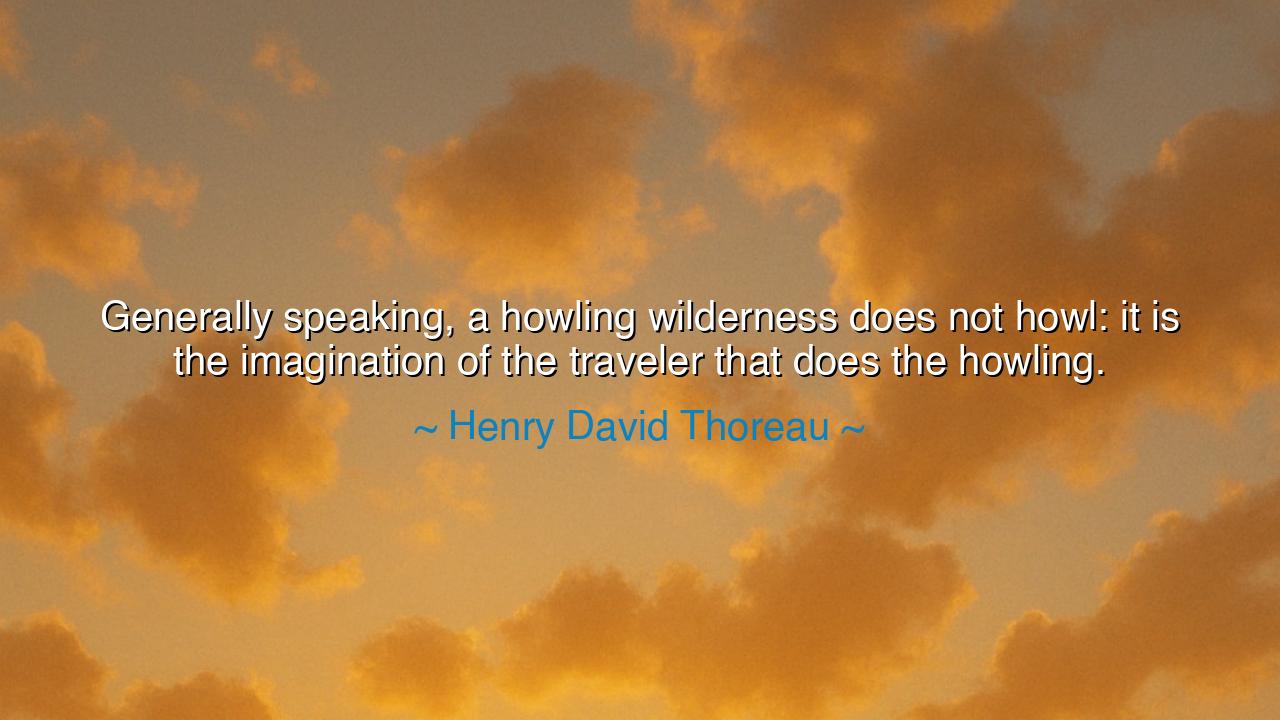
Generally speaking, a howling wilderness does not howl: it is the
Generally speaking, a howling wilderness does not howl: it is the imagination of the traveler that does the howling.






The Howling Within: The Traveler’s Imagination
Hear, O listener, the wisdom of Henry David Thoreau, the wanderer of woods and seeker of silence, who once said: “Generally speaking, a howling wilderness does not howl: it is the imagination of the traveler that does the howling.” In this quiet utterance lies a truth as vast as the forest and as deep as the mind of man. For the wilderness — though grand, though untamed — does not possess terror by its nature. It is the traveler’s heart, trembling with fear or awe, that fills the stillness with cries. The howl is not born of the earth — it is born of the imagination.
The ancients understood this: that the world is not what it seems, but what we believe it to be. A valley may be a paradise to one, and a desolation to another. The night may sing of peace to the poet and of dread to the fearful. Thus Thoreau, walking through the wild lands of Concord, saw that man projects his own spirit upon creation. The wilderness is silent; it is our thoughts that speak. It is the heart, not the forest, that howls. The fearful man hears menace in the rustle of leaves; the wise man hears music. What we perceive in the world is a mirror of the soul we carry within us.
Think of the traveler crossing the Sahara. The desert is not cruel — it simply is. The sun burns as it has burned for eons; the wind whispers as it always has. Yet some, when they gaze upon that endless sand, feel despair, and cry, “This is death!” Others, with hearts like fire, see instead an ocean of possibility, a realm untouched by man’s corruption. The same wilderness reveals both dread and wonder, depending on who beholds it. So it is with all life. The outer landscape is shaped by the inner one.
In this way, Thoreau teaches us that fear, loneliness, and despair are not born from the wild, but from within. When the traveler feels lost and alone, it is his own imagination that magnifies the emptiness. The forest becomes haunted not because it is, but because he believes it so. This truth is echoed in the story of Ernest Shackleton, the polar explorer. When stranded amid the Antarctic’s frozen desolation, his men trembled at the endless white, hearing in the wind a deathly howl. Yet Shackleton’s spirit refused to yield. He saw not a wasteland but a challenge worthy of the soul’s courage. Where others heard howls of doom, he heard the whisper of endurance — and he led them home. The landscape did not change; their imagination did.
So too in the journey of our own hearts. When life feels barren, when hope seems swallowed by silence, remember: it is not the world that howls, but the mind that trembles. The same trial that crushes one may strengthen another. The same solitude that frightens some may free others. The wilderness of circumstance is but a mirror reflecting our inner state. If we would quiet the howling, we must quiet the soul. If we would find beauty, we must bring beauty with us into the silence.
The wise, therefore, do not flee from the wilderness; they walk into it with reverence. They know that the storm outside is a faint echo of the one within — and that to master fear, one must first understand it. When you feel the world raging against you, pause and ask: “Is it the earth that cries, or is it I?” In that stillness, truth will speak. You will see that peace lies not in the taming of nature, but in the taming of self.
So take this teaching, children of the ages: The wilderness does not howl — we do. Still your imagination when it deceives you. Learn to see the world as it is — vast, silent, and full of quiet grace. Let your inner voice fall silent long enough to hear the earth’s true song. Then, the forest will cease its howling, and you will find not terror, but belonging. For the wilderness has always been your home — it was only your fear that made it seem foreign.






AAdministratorAdministrator
Welcome, honored guests. Please leave a comment, we will respond soon